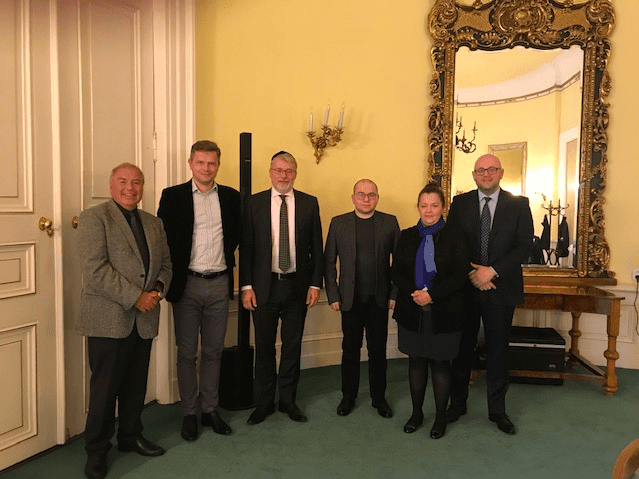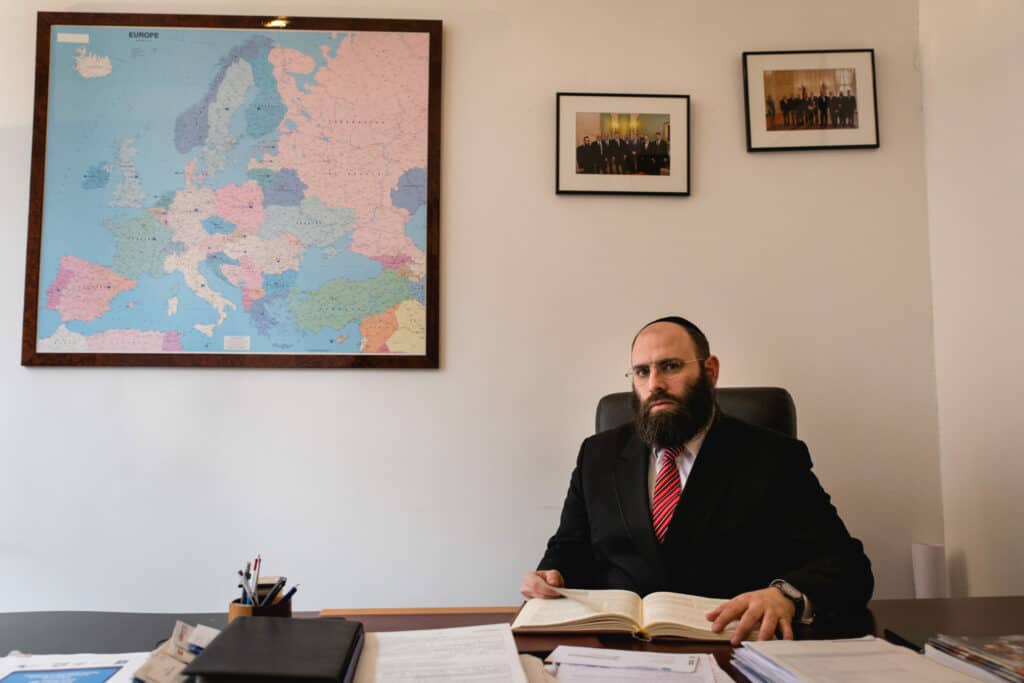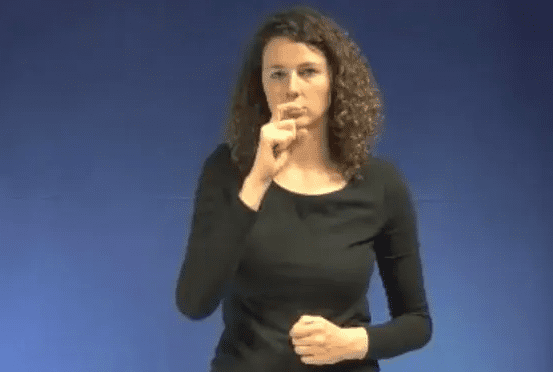The EJA warmly thanks H.E. Zoran Tegeltija, Chairman of the Council of Ministers of Bosnia and Herzegovina, for His Excellency’s kind wishes to the European Jewry in light of the recent holiday of Rosh Hashanah (Jewish New Year).


The EJA warmly thanks H.E. Zoran Tegeltija, Chairman of the Council of Ministers of Bosnia and Herzegovina, for His Excellency’s kind wishes to the European Jewry in light of the recent holiday of Rosh Hashanah (Jewish New Year).



Yesterday, on 3 October 2019, the European Jewish Association and our partners from the Action and Protection Foundation /Hungary/ have had a chance to further advance our ongoing promotion activities on the European Curriculum and Textbook Project against Antisemitism – this time in Prague, the beautiful capital of the Czech Republic.
At the meeting, where the EJA has been represented by Mihails Vorobeičiks-Mellers (Political Affairs Adviser) and the APF by Ferenc Olti (Board Member of the Hungarian Jewish Cultural Association) and Kálmán Szalai (Secretary), we have met with Jaroslav Faltýn (Director at the Department of Preschool, Basic, Basic Artistic and Special Education), Ladislav Bánovec (Director at the Department for International Relations) and Helena Čermáková (Department for International Relations) of the Ministry of Education, Youth and Sports of the Czech Republic.
The conversation, lasting close to 1.5 hours, has touched upon not only the project itself as well as the earlier Hungarian seven-year-ran program it is based on, but also the Czech school curriculum, educational programs and their development, existing system of teacher training, long-time knowledge and expertise exchange initiatives (including those related to the Czech Jewish community, its history and contributions towards beloved homeland) and many other topics.
Following the very informative descriptions provided by both sides and respective opinion exchanges, not only has it been agreed that further contacts on the initiative would be more than welcome and should be strongly encouraged, but also several concrete steps have been identified, which could be shortly implemented. These include designation of contact persons and execution of at least a few possible follow-up meetings (e.g., with Jewish leadership and experts as well as student associations, including those from abroad), which may take place already very soon.
We are most thankful to Mr. Faltýn, Mr. Bánovec, Ms. Čermáková and their colleagues at the Ministry for the reciprocated interest and for being such wonderful hosts, a most interesting and insightful conversation, and very much look forward to further contacts on the present initiative.


In first detailed country study for Moldova, 36% of respondents feel Jews use dishonest means to achieve aims, 19% have a negative perception of Jewish people and around 14% “really don’t like them” Other concerning findings: 32% say Jews exploit non-Jews and 36% Jews seek to gain advantage from the Holocaust and 37% said that Jews talk too much about it.
(Brussels 5 March 2024) The Brussels-based European Jewish Association (EJA), representing hundreds of Jewish Communities across the continent, and Budapest-based Action and Protection League today published a comprehensive report on antisemitic attitudes in the Republic of Moldova, as part of shared efforts to get an accurate continent-wide picture of current attitudes towards Jews.
The land-locked country of 2.5 million citizens has a small Jewish population of around 1,900, equating to 0.7% of all citizens, which, says EJA Chairman Rabbi Menachem Margolin, shows an irrational and alarmingly high prevalence of antisemitic attitudes.
The survey, conducted between October 20th and November 14th, 2023, gathered 923 valid responses from the adult population of Moldova. The study utilized a stratified, probabilistic sampling method to ensure the sample’s representativeness.
The Moldovan government has taken some actions in combatting antisemitism such as adopting the IHRA definition and changing the penal code to include the promotion of fascist, racist or xenophobic ideologies, public denial of the Holocaust, glorification of exponents of fascism/Nazism and the use in public or for political purposes of fascist, racist or xenophobic symbols.
Speaking as the survey was published, Rabbi Menachem Margolin, Chairman of the European Jewish Association said today: “The Moldova survey on antisemitism is part of our ongoing efforts to properly map the situation affecting Jews across the continent. “It is sadly clear that – despite some government efforts – deep-rooted antisemitism persists in Moldova. There can be no rational explanation as to why a community that represents such a tiny fraction of the overall population bears the brunt of such an alarmingly high number of stereotypes and tropes.
“It will take much more than the adoption of the IHRA definition and changes to the legal code to make an impact on the antisemitic attitudes present in the Country. Change in the classroom is as a matter of urgency, if not the next generation will perpetuate and carry the virus of antisemitism with them. The Moldovan government has a tough road ahead in eradicating these old antisemitic attitudes that have no place in any modern country, especially one that seeks to join the European Union.” Ends

Top European rabbi tells Israel Hayom a special center to monitor real-time incidents via remote feeds could be established in order to tackle anti-Jewish attacks.
The recent terrorist attacks in Austria and France, as well as the spike in coronavirus cases in Europe, has created a fear among Jews in the continent that anti-Semitic conspiracy theories blaming Jews for the spread of the pandemic could become mainstream.
A recent study in Germany showed that one in three Germans has somewhat of a conspiratorial view of the world.
Felix Klein, who is the federal commissioner for Jewish life in Germany and the fight against anti-Semitism, told Israel Hayom that the recent protests against the COVID-19 regulations have become fertile ground for anti-Jewish sentiment.
“The current protests against corona-related restrictions serve as a rallying point for antisemites, Holocaust deniers, and believers in conspiracy myths. At “hygiene protests”, participants downplay the Holocaust by, for example, comparing the current requirement to wear a face mask with the obligation to wear a Star of David during the Nazi regime,” he told Israel Hayom. “Portraying themselves as rebels – as do for example the supporters of the new political party Widerstand2020 (Resistance2020) and the Reichsbürger movement – is typical of adherents to anti-Semitic beliefs: Presenting oneself as breaking taboos, as ‘finally’ bringing the truth to light, as showing at last who is pulling the strings behind the scenes – and, as has been done for thousands of years, pointing their fingers once again at Jews,” he added.
When asked about the danger posed by such conspiratorial views, he noted that there is a concern verbal statements could eventually morph into action.
“Conspiracy myths also prepare the ground for violence, as history has shown. Those who perceive themselves as victims and feel threatened can themselves turn into a threat. Anti-Jewish pogroms throughout history have been the fatal consequence of such obsessive hatred of Jews, as have the antisemitic terrorist attacks worldwide in recent years,” he said. “A recent study has shown that radicalization online takes place four times faster than offline. That is what makes it so important to quickly adjust our laws. This is the thrust of the package of measures put forward by the federal government. I am confident we can achieve a lot through a combination of repression and education. After all, what is ultimately at stake is social cohesion in times of crisis.”
Meanwhile, Jewish groups have scrambled to deal with the threat of rising anti-Semitism in the age of coronavirus. The group “Concert – Together for Israel” strives to bolster Israel’s image and fight modern anti-Semitism, says its job has been made much more difficult in the wake of the pandemic, and many pro-Israel groups are facing potential elimination.
“Generally speaking, one can say that small organizations that rely on a small staff expect a slowdown and a long recovery, but the big organizations that need a large operation worry about their long-term viability in light of the added costs,” Nava Edelstein, the group’s program director says.
Rabbi Menachem Margolin, the head of the Brussels-based European Jewish Association that has led a comprehensive effort to counter anti-Semitism in Europe, told Israel Hayom that he has been overseeing a “virtual command center” that gets daily updates from Jewish communities on online anti-Jewish attacks.
“We constantly see how anti-Semitic voices on the web attribute the virus to a Zionist-Jewish conspiracy, on top over other forms of anti-Semitism that involve graffiti and vandalizing of Jewish institutions,” he said, adding the largest volume of reports originates in France, Romania and Belgium.
“We are considering setting up a center that would monitor events through Jewish communities’ video feeds in real time, so that we can alert security forces when such incidents happen,” he revealed.
The article was published in Israel Hayaom

Our story about Universiteit Gent’s repugnant Sign language dictionary for Jew went viral. From El Pais in Spain, the Guardian in UK, From France to Belgium, the US to Israel, the image of a woman signing a hook-nose to denote Jew is as shocking to the media as it was to us and the family who dioscovered. We are still awaiting a formal explanation from the Rector of the University. They have already captioned them as derogatory but this is not enough. No deaf person should be signing Jew in this way. It is offensive. Full stop. We will keep you updated.
The guargian
It’s a challenging time for Jewish communities in Europe. Anti-Semitism is on the rise as populism and the politics of the lowest common denominator are gaining traction. Our communities often need round the clock protection and our practices and customs such as keeping Kosher are under pressure from increasing political interference.
| Cookie | Duration | Description |
|---|---|---|
| cookielawinfo-checkbox-analytics | 11 months | This cookie is set by GDPR Cookie Consent plugin. The cookie is used to store the user consent for the cookies in the category "Analytics". |
| cookielawinfo-checkbox-functional | 11 months | The cookie is set by GDPR cookie consent to record the user consent for the cookies in the category "Functional". |
| cookielawinfo-checkbox-necessary | 11 months | This cookie is set by GDPR Cookie Consent plugin. The cookies is used to store the user consent for the cookies in the category "Necessary". |
| cookielawinfo-checkbox-others | 11 months | This cookie is set by GDPR Cookie Consent plugin. The cookie is used to store the user consent for the cookies in the category "Other. |
| cookielawinfo-checkbox-performance | 11 months | This cookie is set by GDPR Cookie Consent plugin. The cookie is used to store the user consent for the cookies in the category "Performance". |
| viewed_cookie_policy | 11 months | The cookie is set by the GDPR Cookie Consent plugin and is used to store whether or not user has consented to the use of cookies. It does not store any personal data. |